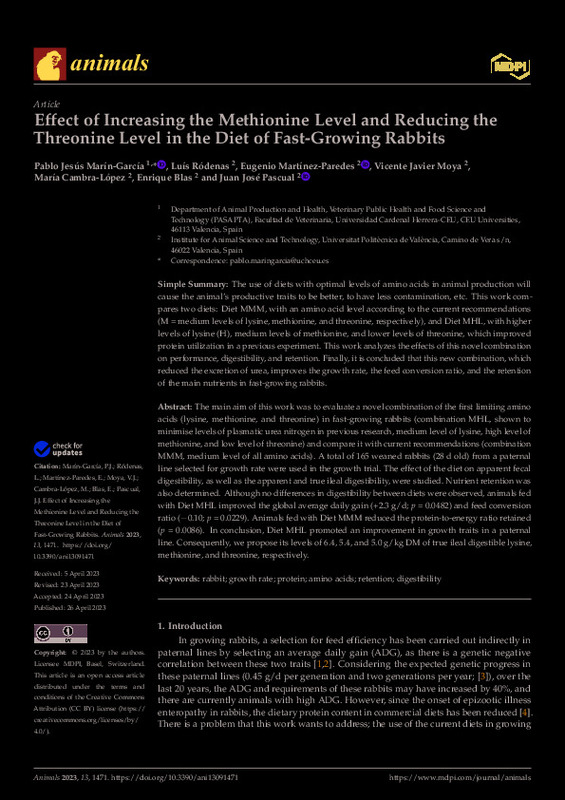JavaScript is disabled for your browser. Some features of this site may not work without it.
Buscar en RiuNet
Listar
Mi cuenta
Estadísticas
Ayuda RiuNet
Admin. UPV
Desde el lunes 3 y hasta el jueves 20 de marzo, RiuNet funcionará en modo de solo lectura a causa de su actualización a una nueva versión.
Effect of Increasing the Methionine Level and Reducing the Threonine Level in the Diet of Fast-Growing Rabbits
Mostrar el registro completo del ítem
Marín-García, PJ.; Ródenas Martínez, L.; Martinez-Paredes, E.; Moya, V.; Cambra López, M.; Blas Ferrer, E.; Pascual Amorós, JJ. (2023). Effect of Increasing the Methionine Level and Reducing the Threonine Level in the Diet of Fast-Growing Rabbits. Animals. 13(9):1-12. https://doi.org/10.3390/ani13091471
Por favor, use este identificador para citar o enlazar este ítem: http://hdl.handle.net/10251/201132
Ficheros en el ítem
Metadatos del ítem
| Título: | Effect of Increasing the Methionine Level and Reducing the Threonine Level in the Diet of Fast-Growing Rabbits | |
| Autor: | Marín-García, Pablo Jesús | |
| Entidad UPV: |
|
|
| Fecha difusión: |
|
|
| Resumen: |
[EN] The use of diets with optimal levels of amino acids in animal production will cause the animal's productive traits to be better, to have less contamination, etc. This work compares two diets: Diet MMM, with an amino ...[+]
|
|
| Palabras clave: |
|
|
| Derechos de uso: | Reconocimiento (by) | |
| Fuente: |
|
|
| DOI: |
|
|
| Editorial: |
|
|
| Versión del editor: | https://doi.org/10.3390/ani13091471 | |
| Código del Proyecto: |
|
|
| Agradecimientos: |
|
|
| Tipo: |
|
recommendations
Sorry the service is unavailable at the moment. Please try again later.









